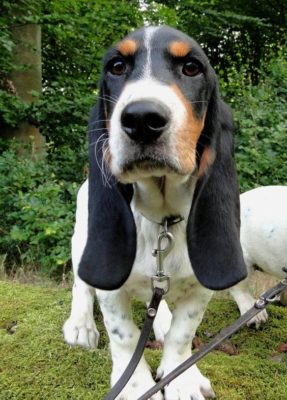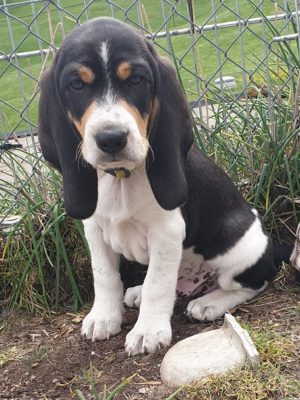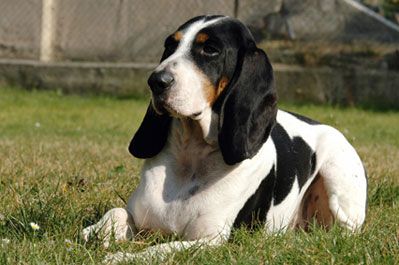Small Bernese Hound
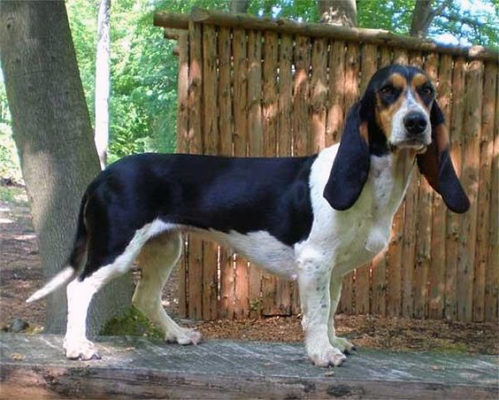
The Small Bernese Hound is considered hardy, free-spirited and free-spirited dog, which is not surprising given its hunting nature. Although it behaves energetically and proactively when hunting, it is quite calm and obedient at home. They are loving, loyal dogs that will make excellent family companions.
Table of Contents
Breed Information
| Another Name | Berner Niederlaufhund |
| Origin | Switzerland |
| Height | Males 35-42 cm Females 31-40 cm |
| Weight | 13-18 kg |
| Fur | Short |
| Color | Black and white |
| Lifespan | 13-15 years |
| FCI Classification | Scent hounds and related breeds |
| Group | Hunting dogs, dogs for children |
| Price | From $700 |
Breed Photos
Origin History
The Small Bernese Hound is a Swiss breed, one of the four small Swiss hounds bred from a cross between French hounds and Bassets. Exact information about what year this breed has not to exist, but in Switzerland, there are pictures of the IX century, which shows a dog that is very similar to the Small Bernese Hound. It is believed that this breed was born around this period or a little earlier.
For many years, the Small Bernese Hound has been used by Swiss hunters because of its keen sense of smell, small size, and ability to hunt both small and large game. The Small Bernese Hound peaked in popularity in the 1930s, a period in which the Swiss hound was called the greatest hunting dog in the world in its homeland.
Appearance
The Small Bernese Hound is a short dog with a long muscular neck and an elongated body with short limbs. Because of these physical parameters, the Small Bernese Hound became popular among Alpine hunters who owned small hunting grounds. The use of larger hunting breeds in these areas was almost impossible because of their speed and size.
Narrow head, long floppy ears, wide black nose, dark eyes – all this is about the Small Bernese Hound. Representatives of this breed have a very piercing and kind look, the attractiveness of which will not let you pass by this beauty without paying attention to him.
The Small Bernese Hound is the only Swiss hound that can have a stiff or smooth coat. The breed with a stiff coat has no undercoat, while those with a smooth coat have a thick undercoat. This breed is black and white with reddish spots on the cheeks and eyebrows and less often on the chest.
Character
The Small Bernese Hound is considered hardy, free-spirited and free-spirited dog, which is not surprising given its hunting nature. Although it behaves energetically and proactively when hunting, it is quite calm and obedient at home. They are loving, loyal dogs that will make excellent family companions.
Small Bernese hounds have good “vocal data” – ringing and sometimes intrusive barking will not give any chance to keep silence in the house for a long time. It is one reason why it is better not to keep a small Bernese hound in an apartment.
For this breed to feel happy and healthy, they need a sufficient amount of exercise and exertion. The Small Bernese Hound needs plenty of space, not only when walking but also at home. The second reason why representatives of this breed shouldn’t live in an apartment.
The Small Bernese Hound is great with other dogs, but at the same time, owners of this dog should think twice before getting small animals – ferrets, rabbits, guinea pigs. Having an excellent sense of smell, the Small Bernese Hound does not like these small animals because of their smell and can be aggressive.
Care
The care of the Small Bernese Hound is not complicated. This breed’s representatives should be combed once or twice a week with a special brush with natural bristles. It is also possible to use a metal comb to comb the beard and remove dirt. To keep the coat healthy and fresh, it is important to trim the Small Bernese Hound regularly.
Bathing representatives of this breed should be, as needed, using a special anti-allergenic shampoo since these pets are prone to skin allergies. Also, it is necessary not to forget about regular other hygienic procedures – weekly cleaning of ears and eyes, monthly trimming of nails.
Training
Early socialization and training are necessary for small Bernese hounds, not only to keep them physically fit but also to ensure that they adapt well to the family home.
Since the Small Bernese Hound is an active, athletic breed, regular exercise and training should be provided. It cannot be called obedient in training, but if you show patience and respect for the pet without resorting to aggression and cruelty, training will yield results.
Training the Small Bernese Hound needs to be regular. You should not forget about daily active walks and games at home, helping the pet not relax in the periods between training sessions.
Common Diseases
Small Bernese hounds are characterized by good health. They are quite hardy and very rarely fall ill with serious illnesses. Like any hound with floppy ears, the Small Bernese Hound needs increased attention to its ear canals. Constant head bobbing, foul odor and redness on the ears are signals for a veterinarian visit. Failure to treat your pet on time can cause chronic inflammation of the ears.
Infrequent diseases such as patellar dislocation and limb dysplasia occur among small Bernese hounds. To maintain the health of this variety of Swiss Hounds, periodic examinations by a veterinarian and regular blood tests are recommended.
Nutrition
The Small Bernese Hound needs a strictly balanced diet, so it is necessary to control the ratio of fats, proteins, and carbohydrates in the pet’s diet. To provide the required amount of protein, raw meat of lean varieties should be included in this breed’s representative diet. It is also possible to feed the pet with vegetable soups in meat broth, milk porridge, and occasionally boiled vegetables.
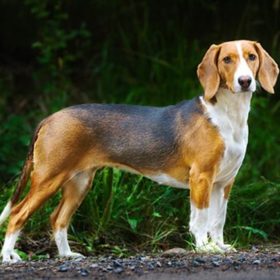 German Hound
German Hound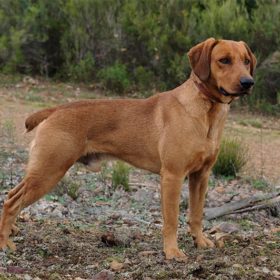 Segugio Maremmano
Segugio Maremmano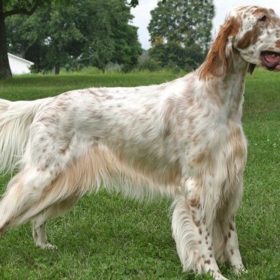 English Setter
English Setter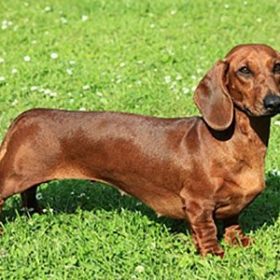 Dachshund
Dachshund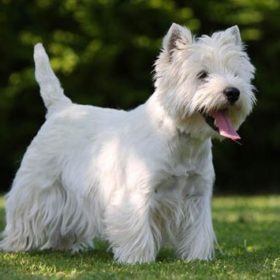 West Highland White Terrier
West Highland White Terrier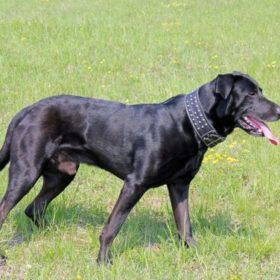 Majorca Shepherd Dog
Majorca Shepherd Dog